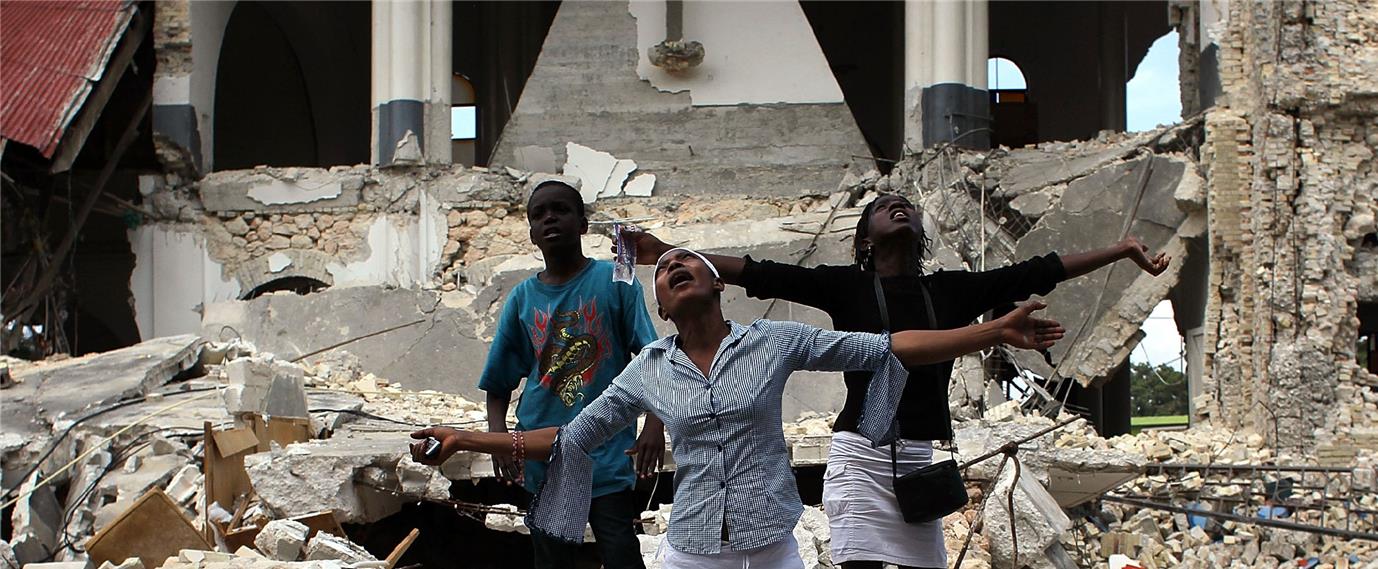أحببتها أثناء زيارتي الأولى للعاصمة "بورت أو برنس" في ربيع العمر، رغم ظروف التمرد السلمي على الدكتاتور جان كلود دوفالييه الابن (1951-2014) في بداية ثمانينيات القرن الماضي. أسرني سحرها عند تلك الشواطئ المترامية وكأنها أيقونة على حوض الكاريبي، وعشقت ما يميز سكانها من وداعة فريدة وطباع هادئة ورقة في المشاعر.
ألهمني تزاوج المفارقات في تاريخها بين إصرار على الكفاح الدائم للتحرر من العبودية، حيث كانت هايتي أول بلد ينال استقلاله في أميركا اللاتينية قبل أكثر من 200 عام، وبين عجز شبه دائم عن مواجهة أزمات البلد التي باتت أشبه بقدر حتمي لا مفر منه.
زلزال تحته ركام
مسّتني مشيئة القدر هذه بذعر شديد أثناء زيارتي الثانية أواسط يناير/كانون الثاني 2010، إثر زلزال أودى بحياة أكثر من ربع مليون شخص، ثم موت عشرات الآلاف نتيجة الجوع والتشرد وانتشار الكوليرا وغيرها من الأوبئة في مخيمات اللجوء، وأحزمة الفقر التي خلفتها سنوات من دوامة عنف واضطرابات تبعت الانقلاب العسكري الذي أطاح بالرئيس المنتخب جان بيرتران أريستيد (مواليد 1958)، فتحول البلد إلى ما يشبه الركام الناجم عن زلزال اجتماعي وآخر جيولوجي لا يقل عنه فتكا.
والأسوأ من ذلك، ما شهدناه كصحفيين ومراقبين من مماطلة وتقصير في إيصال المساعدات الإنسانية العاجلة التي بقيت دون الحدود الدنيا من المستوى المطلوب، ليس في الأرياف والمناطق النائية فحسب، بل في وسط العاصمة نفسها، حيث بقيت جثث الضحايا منتشرة بين الأنقاض المحيطة بالقصر الرئاسي لبضعة أسابيع، وتحولت أطراف المخيمات العشوائية التي أقيمت هناك إلى ما يشبه مجمعات النفايات، تنبعث منها روائح جثث متحللة.
تأخر وصول الوفود الصحفية والمساعدات إلى مطار بورت أو برنس الذي لم يتعرض للدمار، وصار مقرا لبعض المرافق الحكومية والوزارات. مع هذا، فقد اضطرت الوفود للانضمام إلى أسطول مساعدات أرسلته فنزويلا بطائراتها العسكرية فور حدوث الكارثة، إذ تبين لاحقا أن الوحدات الأميركية سيطرت على المطار، وخصصته للطائرات العسكرية الرسمية.
كنا نشهد وصول الوحدات الأميركية على متن عشرات الطائرات العسكرية والمدنية، بما يشبه الاستعراض العسكري، في الوقت الذي أجبرنا فيه كصحفيين على نصب المعدات والخيام والإقامة عند أطراف مدرج المطار، قبل إجبارنا على مغادرته نهائيا.
أدركنا أن الوجود العسكري في المطار وراء إخراجنا منه نحو فنادق آيلة إلى السقوط نتيجة استمرار الهزات الأرضية وارتداداتها اليومية التي كانت تتكرر عند ساعات الفجر الأولى على وجه الخصوص، وهو ما يدفع النزلاء إلى التوجه نحو الباحات الأوسع القريبة من المكان تجنبا لسقوط جدران المباني القريبة التي تسبب انهيارها في ارتفاع أعداد ضحايا الزلزال.
فاقمت مغادرة المطار مشقات العمل لأسباب لوجستية وتقنية، ذلك أن سبل التواصل الفضائية وعبر شبكة الإنترنت كانت أقل صعوبة حول المدرج أو على مقربة من المبنى الرئيسي. بل إن قاعات هذا الميناء الجوي تحولت منذ اليوم الثاني لوقوع الكارثة إلى مقر لعمل الوزارات والمؤسسات الحكومية الرسمية الضرورية التي ظلت على تواصل مع بعض المصادر التي تقدم معلومات أولية حول أبعاد الكارثة الإنسانية التي حلت بالبلاد.
صار لزاما علينا اللجوء إلى التحرك المباشر في أحياء المدينة والمناطق المجاورة للتعرف إلى حقيقة ما يجري، رغم العوائق والصعاب التي تراكمت لتعذر التواصل اليومي مع المصادر الرسمية المستقرة في المطار، وإتلاف محطات الهواتف الجوالة، وما تعرضت له شبكاتها من أعطال، بالإضافة إلى ما أصاب الطرقات الداخلية من دمار حال في كثير من الأحيان دون وصولنا إلى الأماكن المنشودة إلا بشق الأنفس.
اضطرت بعض الطواقم الصحفية للجوء إلى سفارات بلدانها للاستعانة بوسائل الاتصالات الداخلية والخارجية الخاصة والمتوفرة لديها، حتى أن بعضها فضل النوم في باحات المقرات الدبلوماسية تجنبا لمخاطر التعرض للسطو وأعمال العنف التي انتشرت في بعض الأماكن إثر حالة الفوضى التي عمت البلاد بُعيْد وقوع الكارثة، وتفاقم الظروف الإنسانية واختفاء الاحتياجات الأساسية كالأطعمة والمياه التي انقطعت في أحياء كاملة، وتعرضت للتلوث في مناطق أخرى بسبب تسرب مياه الصرف الصحي إلى آبار المياه الجوفية المخصصة للشرب.
أجبرتنا الشوارع المدمرة على التحرك فيها مشيا على الأقدام، مما أدى إلى استغراق أعمال التصوير أوقاتا طويلة. وقد تعرضنا جميعا لوقائع وظروف تصعب إزالتها من الذاكرة، فقد بلغ هول الكارثة مستوى جعل تجنب الارتطام بجثث الضحايا من التحديات الشخصية لكل منا أثناء التجول في الأزقة والشوارع الفرعية التي اتخذها الأحياء مبيتا لهم تفاديا للانهيارات، فتراهم يستلقون على جنبات الطريق دون أن تميز الميت منهم من الحي.
توحدت الفرق الإعلامية العاملة بهايتي في المصاعب والمشقات أثناء إعداد المواد الصحفية اللازمة للعمل، فبات على كل منا ابتداع السبل الخاصة والكفيلة باستفراده بالصورة والقصة والخبر.
توجه البعض نحو الضحايا الذين كانوا لا يزالون تحت الأنقاض، واهتم البعض الآخر بحجم المساعدات المتدفقة ومستوى التقصير الدولي الحاصل، في حين ذهب البعض لتغطية أعمال تهريب الأطفال على أيدي مجموعات مريبة قيل إنها تعمل في تجارة الأعضاء.
كانت الأجواء تعكس المنافسة المهنية الحية التي تنبض في شرايين الإعلامي، دون أن تتركه فريسة لمشاعره الإنسانية الصادقة، بل تدفعه للتغلب على الصعاب والتعالي على الجراح، لنقل الصورة الحية والخبر الصادق بأسرع ما يمكن، إلى حشود من متابعين لا يلتفتون إلا إلى الوسيلة الإعلامية الأسرع، والسبق الصحفي الأبرز، والطاقم الإعلامي الأشد قدرة على الإنجاز وسط أشد ظروف العمل الصحفي قسوة وصعوبة.








































